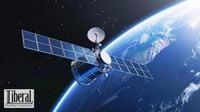The European Union has solidified its position as a leader in the global space technology market, exporting products worth an impressive 1.217 billion euros in 2024. This significant achievement, reported by Eurostat on April 18, 2025, highlights the EU's ongoing commitment to advancing its space capabilities and technologies.
Among the exported products are satellites, suborbital vehicles, and launch vehicles, which are crucial components of modern space exploration and satellite deployment. The announcement from Eurostat coincided with the International Day of Human Spaceflight, celebrated on April 12, further emphasizing the importance of space exploration.
Notably, Bulgaria has made remarkable strides in this sector, with its space technology exports jumping to 5.6 million euros in 2024, a significant increase from just 853,889 euros in 2023. This surge places Bulgaria eighth among the 17 EU member states for which data is available, showcasing its growing role in the European space industry.
Germany emerged as the top exporter within the EU, contributing a substantial 825 million euros to the overall figure. The country's advanced engineering and technological expertise have positioned it as a key player in the space market.
When comparing the figures to pre-pandemic levels in 2019, EU exports have increased by 17 million euros, translating to a 2% rise. In stark contrast, imports of space technology products into the EU have surged by 41%, climbing from 117 million euros to 166 million euros. This discrepancy highlights a growing reliance on external markets for space technology, raising questions about the EU's self-sufficiency in this critical field.
The United States remains the largest recipient of European space exports, absorbing a staggering 77.3% of the total. This indicates a strong transatlantic partnership in space technology and exploration. Following the U.S. are Indonesia and South Korea, which accounted for 9.7% and 8.6% of the imports, respectively.
As the EU continues to innovate and expand its capabilities in space technology, the implications for international collaboration and competition are significant. The strong export figures reflect not only the technological prowess of EU member states but also the increasing global demand for space-related products and services.
In conclusion, the EU's robust performance in space technology exports in 2024 marks a pivotal moment for its space industry, underscoring the importance of continued investment and innovation in this sector. With countries like Bulgaria stepping up their contributions and Germany leading the way, the future of European space exploration looks promising.


